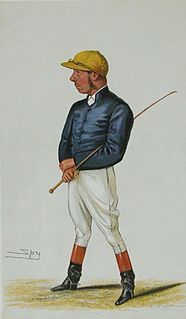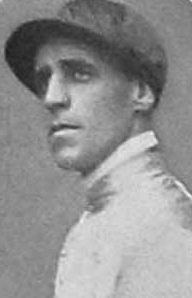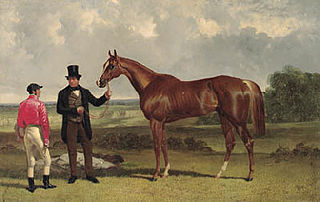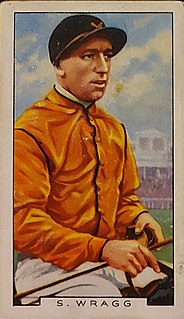
Frederick James Archer, also known by the nickname The Tin Man, was an English flat race jockey of the Victorian era, described as "the best all-round jockey that the turf has ever seen".

Francis Buckle (1766–1832), known to the British horse racing public as "The Governor", was an English jockey, who has been described as "the jockey non-pareil" of the opening quarter of the 19th century, and the man who "brought respectability to race-riding". He won at least 27 British Classic Races during his career, a record which would not be beaten for over 150 years.
Robert Robson (c.1765–1838) was a horse trainer, known as the Emperor of Trainers who ran "the outstandingly successful stable of the first quarter of the 19th century."The leading racehorse trainer of his time, he raised their status from glorified groom to professional.

George Fordham (1837–1887) was a British flat racing jockey. He was Champion Jockey every year between 1855 and 1863, as well as four other occasions in his own right and once as joint champion. He then won the Derby in 1879, won the Oaks five times, and the Grand Prix de Paris three times. His career high was 165 wins in 1862. He was described in 1910 as "one of the greatest jockeys of all-time".

Petrarch, was a British Thoroughbred racehorse and sire who won two British Classic Races in 1876. In a career that lasted from October 1875 to October 1878 he ran sixteen times and won eight races. In 1875, Petrarch won the Middle Park Stakes on his only appearance of the season. As a three-year-old in 1876 he won two of the three races which comprise the Triple Crown, taking the 2000 Guineas at Newmarket and the St Leger at Doncaster. He finished unplaced when favourite for The Derby. As a four-year-old he won three races including the two and a half mile Ascot Gold Cup which at that time was regarded as the most important weight-for-age race in the world. Petrarch was regarded by contemporary experts as a brilliant, but inconsistent performer. After winning once as a five-year-old in 1878 he was retired to stud where he became a successful sire of winners.

Tom Cannon Sr. was a British flat racing jockey and trainer. He won 13 British classics as a jockey, becoming champion in 1872. As a trainer, he trained classic winners, as well as winners over jumps, including the 1888 Grand National. He was the father of four jockey sons, including the six-times champion, Morny Cannon, and the great-grandfather of eleven-times champion, Lester Piggott.

Joseph Childs (1884–1958) was a French-born, British-based flat racing jockey. He won fifteen British Classics in a 35-year career, the last ten years of which were spent as jockey to King George V. He was known for riding a slow, waiting race, and also for having a short temper which regularly saw him at odds with his trainers and owners.
William Arnull was a British jockey. He was from a famous family of jockeys, being the son of John Arnull and nephew of Sam Arnull. Arnull was known to many as the best of the three.

Samuel Chifney Jr. was an English jockey. He was the younger son of a prominent 18th century jockey, also called Samuel Chifney. In terms of talent, he reportedly outshone all his peers, but "he owned a self-destruct button and had a fatal tendency to press it". This failing meant "his talent was not converted into the kind of concrete achievement that stands the test of time".

Job Marson (1817–1857) was an English classic-winning jockey, whose most famous partnership was with Voltigeur, winner of the 1850 Derby and St Leger.
Frederick George Allsopp was a British Derby-winning jockey.

Tom Chaloner was an English jockey who won ten British Classic races, each of them except the 1,000 Guineas at least once. Although he won races across the country, his most notable came in the north of England.
John Daley was a three-time British Classic winning jockey, who most notably won The Derby/Oaks double in 1867.

Thomas French (1844–1873), born in Liverpool, was a Derby winning English jockey.

John "Knickerbocker" Reiff, often called Johnny, was an American flat racing jockey, whose greatest successes came in Great Britain where he won three Classics.
Eric Ephraim Smith was an English flat racing jockey, who rode over 2000 winners, including the winners of three Classics, in a career spanning over 30 years.

Sam Wragg was an English flat racing jockey, who won all of the British Classic Races except the St Leger Stakes in a successful career that straddled World War II.
William Nevett was an English flat racing jockey, who won three wartime Derbies and formed a famous partnership with Dante, one of the horses of the century.

Frederick Edward Rickaby was an English flat racing jockey, who won three fillies' Classics. He is usually referred to as Fred Rickaby Sr. to distinguish him from his son and grandson, both successful jockeys in their own right.
Richard Goodisson was an English classic-winning jockey and trainer, who won the first three runnings of the Oaks Stakes between 1779 and 1781.













